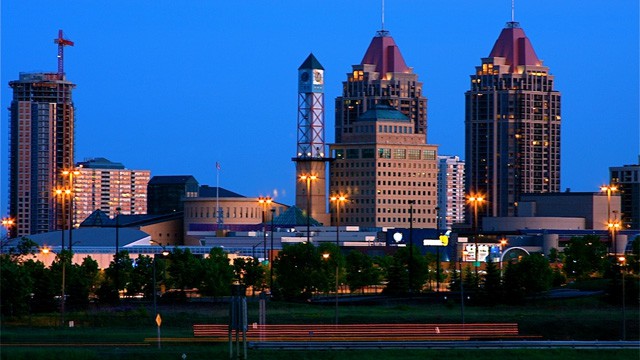Mississauga’s City Centre Needs More Office Space
Published November 2, 2016 at 4:18 pm

In one of my earlier opinion pieces, I mentioned that there has not been a commercial office space built in City Centre for some 20 years and counting. I understand that the Rogers land for the ‘M City’ 10 condos is on land specifically zoned for mixed use development, but it seems we keep slapping up residential towers right and left and shunning all commercial development into business parks far away from residents (even though that is not standard business practices for the big firms looking to locate to Mississauga).
Now, it looks like there might be something coming down the pipeline at the Planning and Development Committee this week that will flesh out a plan for revitalizing what has been branded as ‘Downtown Mississauga’ with a ‘Community Improvement Plan’ (CIP).
You can watch last week’s PDC meeting here and read the PDC Agenda/Corporate Report here.
The CIP is an enabling tool that would allow city council to specifically look into attracting new commercial office development in Mississauga’s downtown core. By approving the CIP, council isn’t necessarily committing any money to it; they’re just giving the green light to look into what sort of tools the the CIP can use in terms of future grants and loan opportunities.
Some of those potential tools (outlined in the city’s Corporate Report) include Tax Increment Equivalent Grants or TIEGs (financial incentives to improve or redevelop property provided in the form of a grant equivalent to a portion of the increase in the municipal property taxes directly attributable to a development/improvement), a development processing fees rebate, a municipally funded parking program and a municipal property acquisition and disposition program (the city may acquire key properties for the purposes of redeveloping them for major office buildings).
After the presentation on the CIP plan, several members of the public as well as two affected stakeholders, Oxford Properties and Morguard, made presentations showing concern and overall support for the idea.
The first deputation regarding the CIP came from John Filipetti, representing Oxford Properties on behalf of Square One.
Filipetti expressed concern over a lack of clarity in the language of the CIP, the administrative and approval process and commented on the parking authority proposal. On the lack of clarity in the CIP language, Filipetti expressed concern over the language surrounding the rezoning of land, because it wasn’t very clear. Regarding the administration and approval process, in comparison with city of Toronto procedures, delegations were allowed a greater level of certainty. Finally, while the parking plan is a good approach, Filipetti suggested other mechanisms to put in place to reduce the cost of parking, since that is the biggest issue holding back office development.
Margaret Knowles, representing Morguard Investments, also spoke up. Knowles said the draft CIP seems to ignore the current building stock and office space available, as the existing office buildings are still useful. I can understand that opinion; Morguard would like the reap the benefits of having more office space available since they oversee several buildings along City Centre Drive, but if they couldn’t do it in the some 20 years those buildings have been around, then what kind of business could they attract at this point?
This was a great segway into deputations from two members of the public regarding the future of how work would be structured and the need to foster a locally-based business climate that attracts more innovative, creative companies. The first was a woman who asked about how the CIP would affect the future of work. The next phase of work for young professionals (and even some middle-aged professionals) is going to revolve more around working from home and running one’s own business. How does a CIP factor in those considerations?
That led to the next speaker, a Meadowvale resident named Alex Lach, having an overarching point that for office space to be successful in Mississauga’s downtown, it needs a vibrant start-up community to drive demand and growth in City Centre. Lach called for more support for start-up companies who can scale up overtime, in order to avoid a situation like in Calgary. Calgary’s goal of attracting multi-nationals worked because they had a big oil boom for decades; now that oil prices have slumped, there are many empty office towers in Calgary and a rising vacancy rate in commercial real estate.
Mississauga’s problem is that there isn’t much office space available to house large firms, and there are no large firms attracted to the downtown core yet. Multinational firms still set up their headquarters in office parks away from Mississauga’s downtown because of cheaper rent and proximity to the airport. Lach also said that while the LRT will eventually make the City Centre more attractive as a living destination, fostering a business climate based on local Mississauga talent must take root first in order to build that foundation.
There is a growing start-up business community in Mississauga, and if those companies (along with any potential larger firms) can grow by relocating to a revitalized downtown Mississauga, then we will be well on our way to becoming an actual complete city.
Follow me on Twitter at @thekantastic
INsauga's Editorial Standards and Policies


